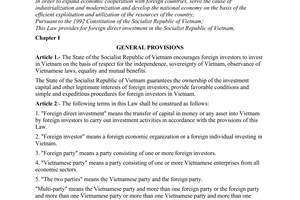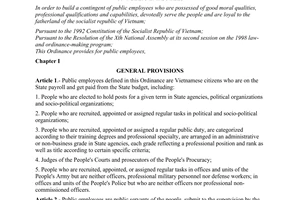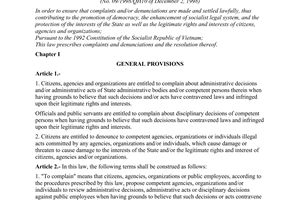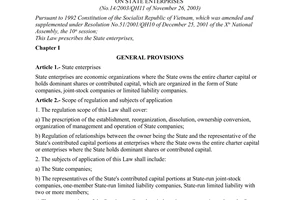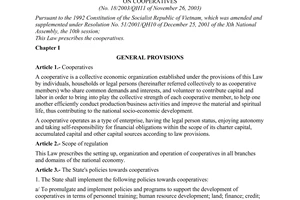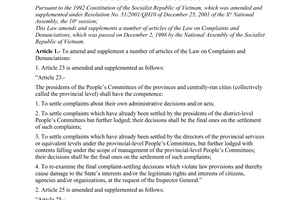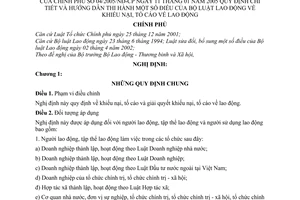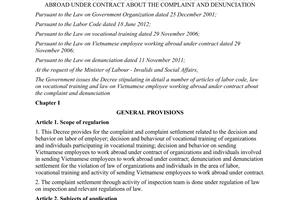Decree No.04/2005/ND-CP on detailing and guiding the implementation of a number đã được thay thế bởi Decree No. 119/2014/ND-CP detail of Labor code Law on vocational training Law on Vietnamese employee và được áp dụng kể từ ngày 01/02/2015.
Nội dung toàn văn Decree No.04/2005/ND-CP on detailing and guiding the implementation of a number
|
THE
GOVERNMENT |
THE
SOCIALIST REPUBLIC OF VIETNAM |
|
No.: 04/2005/ND-CP |
Hanoi, January 11, 2005 |
DECREE
OF THE GOVERNMENT NO.04/2005/ND-CP OF JANUARY 11, 2005 DETAILING AND GUIDING THE IMPLEMENTATION OF A NUMBER OF ARTICLES OF THE LABOR CODE REGARDING COMPLAINTS, DENUNCIATIONS ON LABOR
THE GOVERNMENT
Pursuant to the Law on Governmental Organization dated December 25, 2001;
Pursuant to the Labor Code dated June 23, 1994, the Law amending and supplementing some Articles of the Labor Code dated April 02, 2002;
At the request of the Minister of Labour - Invalids and Social Affairs,
DECREE:
Chapter 1:
GENERAL PROVISIONS
Article 1. Scope of governing
This Decree provides for complaints, denunciations and the settlement of complaints and denunciations on labor.
Article 2. Subjects of application
This Decree shall apply to employees, labor collectives and employers including:
1. Employees, labor collectives working in the following organizations:
a) Enterprises established and operating under the Law on State-owned Enterprises;
b) Enterprises established and operating under the Enterprise Law;
c) Enterprises established and operating under the Law on Foreign Investment in Vietnam;
d) Enterprises of political organizations, social - political organizations;
đ) Cooperatives established and operating under the Cooperative Law;
e) State agencies, administrative units, political organizations, social - political organizations, professional - social - political organizations, social-professional organizations, other social organizations;
g) Units, the economic organizations of the People's Army force, the People's Public Security;
h) Agencies and organizations that have signed labor contracts with employees to send abroad for training, professional development, skill improvement;
i) Farms, individuals and households using employees;
k) Semi-public establishments or people founded, private establishments of sectors of culture, health, education, training, science, physical education, sports, and other sectors;
l) The foreign agencies, organizations or individuals or international organizations based in Vietnam using employees under the labor law of Vietnam, except for international agreements which the Socialist Republic of Vietnam has signed or acceded to otherwise provided for.
2. The employers shall include:
a) General Directors, Directors of State-owned enterprises, private enterprises, joint stock companies, limited liability companies, partnerships;
b) Chairmen of the cooperatives, individuals, householders hiring employees;
c) The heads of state agencies, administrative units, political organizations, political - social organizations, professional – social- political organizations, social-professional organizations, other social organizations using employees under the labor contracts;
d) The heads of units, economic organizations of the People's Army forces, the People's Public Security using the employees under labor contracts;
đ) The General Directors, Directors of enterprises with foreign-owned capital operating under the Law on Foreign Investment in Vietnam, foreign agencies, organizations, individuals or international organizations based in Vietnam using laborers under labor contracts;
e) Directors of companies, heads of Vietnamese agencies, organizations and individuals based in Vietnam using foreign laborers.
3. In the case international treaties which the Socialist Republic of Vietnam has signed or acceded to otherwise provide for herein shall apply the provisions of such international treaties.
Article 3. Subjects of not applying
1. This Decree shall not apply to the following subjects:
a) Officials and civil servants under the Ordinance on Officials and Civil Servants;
b) The cooperative members of cooperatives under the Cooperatives Law;
c) The officers, noncommissioned officers, soldiers, professional soldiers and officers of the People's Army forces and the People's Public Security forces;
d) Laborers working overseas in the forms prescribed in Clause 30, Article 1 of the Law amending and supplementing some Articles of the Labor Code.
2. This Decree shall not apply to the following cases:
a) Lodging complaints and denunciations on the decisions, acts not of labor relations;
b) Lawsuits under the provisions of the Code of Civil Procedure on the procedure for resolving labor disputes.
Article 4. Interpretation of terms
In this Decree, the following terms shall be construed as follows:
1. "Complaint" means the employees, the labor collectives request the competent individuals, authorities to reconsider the decision, the behavior of the employers when having evidence that those decisions or acts commit violation of labor law, and infringement of their legitimate rights and interests.
2 "Denounce" means the workers, the labor collectives to inform the individuals, the competent authorities on the decisions, violations of labor laws of employers who cause damage or threat to cause damage to the interests of the State, legitimate rights and interests of laborers and labor collectives.
3. "Complainants" mean laborers, labor collectives to exercise the complaints.
4. "Complained persons" mean the employers who make the decisions, the acts to be complained.
5. "Denouncers" mean the workers, labor collectives to conduct the right of denunciation.
6. "Denounced persons" mean the employers who make the decisions, the acts to be denounced.
7. "The complaint settlers" mean the agencies or individuals who are competent to settle complaints.
8. "The denunciation settlers" mean agencies and individuals who are competent to settle denunciations.
9. "Settlement of complaints" means the verification, conclusions, and decision making of settlement of agencies, the persons who are competent to settle complaints.
10. "Settlement of denunciations" means the verification, conclusions on contents of the denunciations and handling decisions of agencies and persons who are competent to settle denunciations.
11. "The effective decisions of complaints settlement" include: decisions on the first settlement of complaint or decisions on the settlement of complaint for the following time within the time limit prescribed by law, the complainants did not continue to complain; decisions on the final settlement of complaint.
12. "Chief Inspector of the Department" means the chief inspector of the Department of Labour - Invalids and Social Affairs.
13. "Chief Inspector of the Ministry" means the Chief Inspector of the Ministry of Labour - Invalids and Social Affairs.
14. "The decision on labor" means a written decision of the employers applied for laborers, labor collectives in the labor relations and social relations that are directly related to labor relations.
15. "Acts of labor" mean the act of employers carried out in the labor relations and social relations that are directly related to labor relations.
16. Date that is calculated to determine the prescription for lodging and settling complaints and denunciations is the working day of state administrative agencies or individuals who are entitled to receive complaints and denunciations.
Article 5. Principles for settling complaints and denunciations
1. Objective, honest, and lawful.
2. Promptly, quickly and publicly.
3. Proper authority, order, procedures, and time limits as prescribed by law.
Chapter 2:
COMPLAINTS SETTLEMENT
SECTION 1: RIGHTS AND OBLIGATIONS OF THE COMPLAINANTS, THE COMPLAINED PERSONS
Article 6. Rights and obligations of the complainants
1. The complainants have the following rights:
a) To take the right of complaint by themselves or through their legal representatives;
b) The complainants do not agree with the decisions on the first settlement of complaint of employers and labor inspectors upon inspections, they may complaint to the chief inspector of the Department; and if the complainants and the complained persons disagree with the settlement decisions of the Chief Inspector of the Department, they may continue to complaint to the Chief Inspector of the Ministry;
c) To be restored the rights and legal interests that have been infringed, to be paid compensation for damages under complaint settlement decisions;
d) To withdraw their complaints at any stage of the settlement process.
2. The complainants have the following obligations:
a) To send the written complaints to the right persons who are competence;
b) The written complaints must be clearly stated the reason, the contents of complaints, presented honestly on the matter; to supply information, documents and evidence required (if any); to take responsibility before law for the contents of the complaint and information, documents and evidence provided;
c) To comply strictly with the complaint settlement decisions that took effect.
Article 7. Rights and obligations of the complained persons
1. The complained persons have the following rights:
a) To provide evidence on the legality of the decisions of labor, labor acts to be complained;
b) To be received the complaint settlement decisions of the next complaint settlers for the complaints that they have been settled but the complainants continue to complain.
2. The employers to be complained have the following obligations:
a) To receive and resolve complaints of labor for the first time;
b) To take responsibility for inspecting and reviewing the decision of labor, labor acts to be complained; if found that they are unlawful, promptly repair and restore the legitimate rights and interests of laborers;
c) To explain on the decisions of labor, the labor acts to be complained, to supply information, documents, and concerned evidence at request of the competent agencies;
d) To strictly abide by the complaints settlement decisions on labor took effect;
đ) To pay compensation for damage and overcome the consequences caused by decisions, acts contrary to labor legislation in accordance with the law provisions.
SECTION 2: COMPETENCE OF COMPLAINTS SETTLEMENT
Article 8. Competence to settle complaints
1. The employers are responsible for settling the first complaint of laborers, the labor collectives.
2. When conducting the inspections, labor inspectors have the right to receive and resolve complaints in accordance with labor laws.
3. Chief Inspector of the Department has jurisdiction over labor complaints that employers or labor inspectors have settled but also be appealed.
4. Chief Inspector of the Ministry has jurisdiction over labor complaints that Chief Inspector of the Department has settled but also be appealed. Settlement decisions of the Chief Inspector of Ministry are the final decisions on resolution.
Article 9. Prescription for complaint
Prescription for complaint is 90 days from the date the complainant receives the decision on labor or knows the labor act.
In case of sickness or natural disasters, enemy-iflited devastation, working, studying in the far places or because of other the objective obstacles which the complainants cannot make the right to appeal in accordance with the prescription, the obstructed time is not included in the time for complaint.
Article 10. The right to choose the complaints settlers
If employees, labor collectives do not lodge lawsuit at the competent court shall have the right to appeal under the provisions of this Decree.
SECTION 3: COMPLAINT SETTLEMENT PROCEDURES
Article 11. The complaints to be refused to receive for settlement
1. Contents of decisions, acts of the complained persons are not subject to the governing scope of labor law and not directly related to the legitimate rights and interests of the complainants.
2. The complainant does not have adequate civil act capacity without legal representative.
3. The representative of the complainant is illegal.
4. The prescription for complaint, time limit for the next complaint has expired.
5. It has the decision on final settlement of complaint.
6. The complaint has been or is accepted for settlement by the People's Court or had effective judgment or decision of the Court.
Article 12. Complaint procedures
1. The complainant must send written complaint specifying the date, month, year of complaint, full name, address, reason, the content of the complaint; name and address of the organization or individual employing laborers to be complained; the complainant's request. The written complaint must be signed by the complainant. The written complaints must be sent to agencies, organizations, and individuals who have jurisdiction to settle.
2. Where complainant presents directly complaint, the person who takes responsibility must instruct the complainant to make written complaint or record content as prescribed in Clause 1 of this Article, and be signed by the complainant.
3. Where the complaints are made through the representatives, the representatives must have papers to prove their legal rights of representation and the complaints should comply with the procedures specified in clause 1 and clause 2 of this Article.
Article 13. Acceptance for complaints settlement
1. When those who are competent to settle complaints receive the written complaints under the jurisdiction must accept them for settlement. If the written complaints are not under their jurisdiction, shall notify and guide the complainants to send to the competent persons, at the same time, attach documents, documents related to the contents of the complaints (if any). The notification is only made once for a complaint case.
2. For the application that have complaint content and also have content of denunciation, the competent persons shall settle complaint content, and transfer the content of denunciation to those who are competent to settle denunciations as prescribed in Article 26 of this Decree.
3. When conducting inspections, if the employees or labor collectives complaint on the decision of labor, labor acts, labor inspectors shall settle as follows:
a) If the applications have been firstly settled by employers, guide the employees, labor collectives to send written complaints to the chief inspector of the Department;
b) If the written complaints are first received, then process them for settlement.
Article 14. Time limit, the order of the first complaint settlement
1. Laborers, labor collectives complain for the first time on the decision of labor, labor act of the employers, the employers, or labor inspectors upon conducting inspections (hereinafter referred to as the first complaint settler) must receive and settle according to the following order:
a) Within 10 days from the date of receipt of written complaint, the first complaint settler must process to settle and inform in writing to the complainant;
b) Time limit for settling complaints is not later than 30 days from the date of acceptance for settlement; for the complicated cases, the time limit for settling complaints may be extended but must not exceed 45 days from the date of acceptance for settlement;
c) The first complaint settler must meet and dialogue directly with the complainants; for the labor collective’s complaints, it must have the participation of grassroots trade union representative, for those where there is no grassroots trade union, there must be the employees’ representative (high-level trade union) with the participation of labor mediator or other mass organization. The settlement of complaints of first complaint settler must be made by decisions to settle the complaint.
2. Decision to settle the first complaints must contain the following contents:
a) The date, month, year of issuance;
b) Names and addresses of the employee, the employer;
c) The complaint content is true, partially true, or totally untrue;
d) Legal bases for settling complaint;
đ) To retain, modify or cancel all or part of the decision, to terminate the complained acts; solve specific problems in the content of the complaint;
e) The compensation to aggrieved persons (if any);
g) The right of subsequent complaint of the complainant, the complained person.
Decisions on complaints settlement of the first complaint settlers must be sent to the complainants, complained persons (if the first complaint settlers are the labor inspectors when conducting inspections), the chief inspector of the Department, the Labor Federation of provinces, centrally-run cities, concerned units, organizations and individuals.
Article 15. Time limit, the order for settling subsequent complaints
1. Within 30 days after the expiry date of the first settlement that the complaints have not been resolved, the complainant may file a written complaint to the Chief Inspector of the Department.
2. Within 30 days from the date of receipt of the decision of the first complaint settlement that the complainants do not agree, they may send written complaints to the Chief Inspector of the Department.
3. Within 10 days from the date of receipt of the written complaint for the first complaint settlement decision, the complaint settlers for the subsequent time must accept and notify the complainants in writing.
4. The time limit for settling the subsequent complaints does not exceed 45 days from the date of acceptance, for complicated cases, it shall also not exceed 60 days.
5. Within 30 days from the date of receipt of the complaint settlement decision of the Chief Inspector of the Department that the complainants, complained persons disagree, they may continue to appeal to the Chief Inspector of the Ministry.
Article 16. Requirements of temporary suspension of the execution of decisions and acts of the employers
During the settlement of complaints, if considering that the decisions, acts complained of employers that can cause damage to life and health of employees or cause serious harm to the state interests, Chief Inspector of the Department may request the employers to temporarily suspend the execution of the decisions, acts until the decision of the competent agencies.
Article 17. Rights of the Chief Inspector of the Department in resolving complaints
1. In the process of settling complaints, Chief Inspector may:
a) Meet, directly dialogue with the complainants and complained persons to clarify the contents of the complaints, the complainants’ requests and settlement direction;
b) Require the complainants to provide information, documents, and other evidence of contents of the complaints;
c) Require the complained persons to make written explanations of the contents complained;
d) To convene the complainants, the complained persons to hold direct dialogue;
đ) Verify on the spot;
e) Request expertise, conduct other measures as prescribed by law.
2. When individuals, agencies, and organizations receive the requirement of the chief inspector of the Department as prescribed in Clause 1 of this Article shall comply with the requirement.
Article 18. The decision of subsequent complaints settlement
1. The decision of subsequent complaints settlement must be in writing and contain the contents:
a) The date, month, year of issuance;
b) Names and addresses of the complainant, the complained person;
c) Contents of complaint;
d) Results of examination and verification;
đ) Legal bases for settling complaint;
e) Conclusion on the contents of the complaint and the resolution of previous complaints;
g) To retain, modify, cancel or request modification or cancellation of part or all of the decision and to terminate complained act; solve specific problems in the content of the complaint;
h) The damage compensation (if any);
i) The right of subsequent complaint of the complainant, the complained person.
2. The decisions to settle complaints made by the Chief Inspector of the Department shall be sent to the complainants, complained persons, the Labor Federation of provinces, centrally-run cities, Chief Inspector of the Ministry of Labour - Invalids and Social Affairs, the concerned units, organizations, and individuals.
Article 19. Dossiers of complaints settlement
1. The settlement of the complaint must be made in the dossier. Dossier of complaint settlement includes:
a) A written complaint or a record of complaint;
b) Minutes of the examination, verification and conclusion, the results of appraisal;
c) Other relevant documents;
d) The decision to settle complaint.
2. Dossier of complaint settlement must be numbered page in the order of documents and stored as prescribed by law. Where the complaints continue to complain, the dossier must be transferred to the competent authorities for subsequent settlement upon request.
SECTION 4: REVIEW OF DECISION OF FINAL SETTLEMENT OF COMPLAINTS OF VIOLATIONS OF LAW
Article 20. Bases for review of the decision of final settlement of complaint
1. When there is one of the following bases, those who are provided for in Article 21 of this Decree have jurisdiction to review the decision of final settlement of complaint:
a) The discovery of new facts change the basic content of the decision of final settlement of complaint;
b) The contents of the decision of final settlement of complaint are not consistent with the objective facts of the complaint;
c) There are serious violations of order and procedures as verification, conclusion and making the decision of final settlement of complaint causing damage to the interests of the State, legitimate rights and interests of the parties in the labor relations;
d) There are serious mistakes in applying the law.
2. Prescription for reviewing the decision of final settlement of complaint is 24 months from the effective date of that decision.
Article 21. Persons who are competent to review the decision of final settlement of complaint
1. Chief Inspector of the Ministry upon detection of one of the bases specified in Article 20 of this Decree shall review the decision of final settlement of complaint.
2. Minister of Labour - Invalids and Social Affairs, upon detection of one of the grounds specified in Article 20 of this Decree shall require the Chief Inspector of the Ministry to review the decision of final settlement of complaint.
3. When reviewing the decision of final settlement of complaint, the competent persons shall maintain, amend, or cancel the decision of settlement.
SECTION 5: ENFORCEMENT OF EFFECTIVE DECISION OF COMPLAINT SETTLEMENT
Article 22. Enforcement of effective decision of complaint settlement
1. When the decision of complaint settlement takes effect, employers, employees, labor collectives, concerned agencies, and individuals must strictly observe.
2. Where the complaint is correct, the complained person is responsible for organizing the execution of the decision of complaint settlement; termination of complained acts; to modify or cancel the decision to be complained, publicly apologize, restore honor and all material benefits to employees.
3. Where the complaint is not correct, the complaint settler explains, require the complainant to abide by the decision of complaint settlement; in case of necessity, the complaint settler may require labor inspector to take measures within their jurisdiction to ensure the strict execution of the effective decision of complaint settlement.
Article 23. Inspection of the execution of the decision of complaint settlement
Chief Inspector of the Department and Chief Inspector of the Ministry shall inspect the execution of the effective decision of complaint settlement.
Chapter 3:
SETTLEMENT OF DENUNCIATIONS
SECTION 1: RIGHTS AND OBLIGATIONS OF DENOUNCERS, THE DENOUNCED PERSONS
Article 24. Rights and obligations of denouncers
1. The denouncers have the following rights:
a) To send written denunciation or directly to denounce to the chief inspector of the Department or labor inspectors when conducting inspections on the violations of labor legislation of the employer;
b) The denouncers disagreeing with the conclusion of settlement of labor inspectors, chief inspector of the Department shall have the right to denounce to the Chief Inspector of the Ministry;
c) To request to be kept confidentiality, name, address, their autograph;
d) To request to be informed the denunciation settlement results;
đ) To request the competent agencies to protect when threatened, retaliated, revenged.
2. The denouncers have the following obligations:
a) To clearly state their full names, addresses or of representatives of the labor collectives;
b) To honestly present, provide the documents and evidence related to the denunciation contents;
c) To take responsibility before law for false denunciation.
Article 25. Rights and obligations of denounced persons
1. The denounced persons have the following rights:
a) To be informed of the contents to be denounced;
b) To provide evidence to prove that the denunciation contents are not true;
c) To be restored the legitimate rights and interests that have been infringed, be restored honor, to be compensated for damage caused by improper denunciation as prescribed by law;
d) To request the competent authorities to handle the persons who made false denunciation.
2. The denounced persons have the following obligations:
a) To explain of contents to be denounced; to supply information, documents and evidence relevant to the contents to be denounced upon request of the competent authorities;
b) To strictly abide by the handling decisions of the competent agencies;
c) To pay compensation for damage and overcome the consequences caused by their violations of labor laws.
SECTION 1: COMPETENCE OF DENUNCIATION SETTLEMENT
Article 26. Competent to settle denunciations
1. Chief inspector of the Department, labor inspectors when conducting inspections are competent to settle denunciations.
2. Chief Inspector of the Ministry is competent to conclude, settle finally on the conclusion of the denunciation settlement of the chief inspector of the Department or of Labor inspectors when conducting inspections.
SECTION 2: DENUNCIATIONS SETTLEMENT PROCEDURES
Article 27. The procedures of denunciations
The denouncer must submit the written denunciation to the chief inspector of the Department or labor inspector when conducting inspections at the enterprises. In the written denunciation must be clearly stated the full name and address of the denouncer or representative of labor collective that sent the written denunciation; content of denunciation. Where the denouncer presented directly, the labor inspectors or officials of the Department of Labour - Invalids and Social Affairs are responsible for recording the content of denunciation, the full name, and address of the denouncer; with signature of the denouncer for reporting to Chief Inspector of the Department for consideration and settlement.
Article 28. Handling of written denunciation
1. State agencies receiving written denunciation are responsible for classifying and handling as follows:
a) If the denunciation is under the settlement jurisdiction, it must accept to resolve according to the proper order, procedures specified in this Decree;
b) If the denunciation is not under the settlement jurisdiction, at least within 10 days from the date of receipt, it must transfer the written denunciation or record of denunciation words and concerned documents, evidence (if any) to Chief Inspector of the Department, where the head office of the employer who is accused locates;
c) If the acts to be denounced have criminal signs, they shall be forwarded to the investigation agency, the Procuracy for handling according to law provisions.
2. Where the denounced decisions or acts of the employers can cause serious damage to state interests, life and health of employees, the agencies receiving the written denunciation must immediately notify the Chief Inspector of the Department where the decisions were made, the acts of employers were denounced for taking the preventive measures.
3. Where the chief inspector of the Department or labor inspectors when conducting inspections receive information that the denouncers are threatened, retaliated, revenged, they must take the responsibility to direct, or coordinate with concerned function agencies to clarify, take measures to protect the denouncers, prevent and request the competent authorities to handle persons who commit acts of threatening, retaliation, revenge to the denouncers.
Article 29. The time limit for settlement of denunciations
Time limit for settlement of labor denunciation shall not exceed 60 days from the date of acceptance for settlement; for the complicated cases, the time limit for settlement may be extended, but not exceeding 90 days from the date of acceptance for settlement.
Article 30. Receipt of information and documents on denunciation
When directly receiving information and documents supplied by the denouncers, the denounced persons, agencies, organizations and individuals, the denunciation settlers must issue receipts signed by the recipient and suppliers.
Article 31. Assurance of the rights of denounced persons
In the process of settlement of denunciations, those who are assigned task of verification must create condition for the denounced person to explain and provide evidence to prove true, false of the denounced contents.
Article 32. Evidence collection
The collection of documents and evidence in the process of verification and denunciation settlement of labor must be recorded in writing and saved into profile of denunciation settlement. After the verification is completed, those who are assigned task of verification must make written conclusions on the content of denunciations.
Article 33. Handling of the denunciation content
Based on the results of verification and conclusion on denunciation contents, chief inspector of the Department, labor inspectors shall handle as follows:
1. Where the denounced person does not violate labor laws, there must be clear conclusion and notified in writing to the denouncer, the denounced person and concerned agencies, organizations and individuals.
2. Where the denounced person violate labor laws, it must send the written request to the denounced person for complying with the provisions of labor law and depending on nature and seriousness of the violation shall apply the forms of sanctions of administrative violations or propose the competent agencies to handle in accordance with the law provisions.
3. Where the behavior of the denounced person has criminal signs, its dossier shall be transferred to the investigation agency or the People's Procuracy to resolve under the provisions of law.
4. Conclusion on denunciation settlement shall be made in writing and be sent to the denouncer, the denounced person, concerned agencies, organizations, and individuals.
Article 34. Confidentiality and security assurance for the denounced person
Agencies, organizations and individuals receiving or settling denunciation must keep confidentiality on the denouncer, are not disclosed full name, address and autograph of the denouncer and other information may cause harmful to the denouncer.
Article 35. Dossier of denunciation settlement
The denunciation settlement must be made into profile, including:
a) A written denunciation or record of denunciation words;
b) Minutes of the verification, appraisal results, documents, and evidence gathered during the settlement process;
c) A written explanation of the denouncer;
d) Conclusion on denunciation contents; written proposal for handling measures;
đ) Other relevant documents;
e) The handling decision.
Chapter 4:
MANAGEMENT OF THE SETTLEMENT OF COMPLAINT, DENUNCIATIONS
Article 36. Content of management of the settlement of complaints and denunciations
a) To promulgate legal documents on the settlement of complaints and denunciations;
b) To educate, guide and organize the implementation of the provisions of law on complaints and denunciations;
c) To inspect and examine the implementation of the provisions of law on complaints and denunciations;
d) To train and retrain cadres and civil servants to be in charge of settling complaints and denunciations;
đ) To synthesize the situation of complaints and denunciations and the settlement of complaints and denunciations;
e) To sum up experience in the settlement of complaints and denunciations.
Article 37. Responsibilities of the Ministry of Labour - Invalids and Social Affairs
Ministry of Labour - Invalids and Social Affairs is responsible before the Government for the implementation of state management on the settlement of complaints and denunciations on labor within the jurisdiction of the Government.
Chapter 5:
REWARDS AND HANDLING OF VIOLATIONS
Article 38. Rewards
Agencies, organizations and individuals that record achievements in resolving complaints and denunciations, that have merit in the prevention of damage for the State, to protect the lawful rights and benefits for employees shall be rewarded according to law provisions.
Article 39. Handling of violations
Those who have one of the following acts shall, depending on the nature and seriousness of their violations, be disciplined, administratively sanctioned or examined for penal liability, if causing damage, must pay compensation for damage under the provisions of law:
1. Agitating, forcing, seducing, and bribing others for lodging false complaints and denunciation.
2. Taking advantage of the complaints and denunciations to distort, slander, disturb public order, and cause damage to the interests of agencies, organizations, and individuals.
3. Lodging false denunciations.
4. Intimidating, retaliating, and hurting the complainants and denouncers, those who are responsible for settling complaints and denunciations.
5. Failing to execute the decisions of complaints settlement, the decisions of denunciation settlement.
6. Violating other provisions of law on complaints and denunciations on labor.
Article 40. Handling of violations of those who are responsible for settling complaints and denunciations
If those who are responsible for settling complaints and denunciations have one of the following acts shall, depending on the nature and seriousness of their violations, be disciplined or prosecuted for criminal liability, if causing damage, must pay compensation as prescribed by law:
1. Being lack of responsibility in the settlement of complaints and denunciations.
2. Causing troublesome, harassment, obstruction for the implementation of the right to lodge complaints and denunciations.
3. Deliberately delaying the resolution of complaints and denunciations.
4. Falsifying records of the cases during the settlement of complaints and denunciations.
5. Issuing decisions to settle complaints and denunciations contrary to law.
6. Failing to promptly take the necessary measures to stop the violations of law.
7. Intimidating, retaliating, revenging the complainants and denouncers; covering for the complained and denounced persons.
8. Violating other provisions of law on complaints and denunciations.
Chapter 6:
IMPLEMENTATION PROVISIONS
Article 41. Effect
1. This Decree takes effect 15 days after its publication in the Official Gazette. The previous regulations contrary to this Decree are hereby annulled.
2. The complaints and denunciations were accepted, are being considered and resolved before the effective date of this Decree, shall continue to be settled in accordance with the provisions of this Decree.
Article 42. Responsibility for implementation
Minister of Labour - Invalids and Social Affairs shall guide the implementation of this Decree.
The ministers, heads of ministerial-level agencies, heads of governmental agencies, presidents of the People’s Committees of provinces and cities directly under the Central Government, employees, labor collectives and the employers shall implement this Decree.
|
|
Phan Van Khai |
------------------------------------------------------------------------------------------------------
This translation is made by LawSoft and
for reference purposes only. Its copyright is owned by LawSoft
and protected under Clause 2, Article 14 of the Law on Intellectual Property.Your comments are always welcomed

